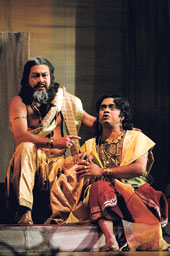 |
| A scene from Ja Nei Bharatey (Sanat Kr Sinha) |
The bloodthirsty moon gazes greedily on the dismembered bodies strewn across the fields. Raja! Did I raise my children to be sacrificed in your war?” the voice of the demoness Patokini is overtaken by an ominous rumble. Manoj Mitra wrote Ja Nei Bharatey in 2005, but when it was finally performed by Sundaram under his direction on July 2 at Academy of Fine Arts, Mitra discovered startling similarities between the events in the play and the ongoing bloodshed in Bengal.
“The power of the deprived people who live close to nature has appeared repeatedly in my plays. Present events sadly bear me out,” said Mitra.
Patokini (played by Mayuri Ghosh) is a fantastic character, half-demon and half-mother goddess. But however violent she is, she is a cog in the system. It is her job to destroy the unwanted children of Hastinapur. Instead of killing the unwanted children Patokini raises them in the forest. It is these children who, she hopes, will someday right the wrongs.
Where the system is unable to nurture life it is left to Mitra’s characters like Patokini, Hekim (of Galpo Hekim Saheb) and Dwaipayan (of Chhayar Prasad) to give shelter and care.
Mitra’s Dhritarashtra (played by Subrata Chaudhury) may remain one of the most attractive characters in Bengali theatre. To begin with, he appears as a sensitive youth who is a misfit not only because he is blind but because he wants to stop war. In the course of the play his dreams are thwarted, ideals shaken.










